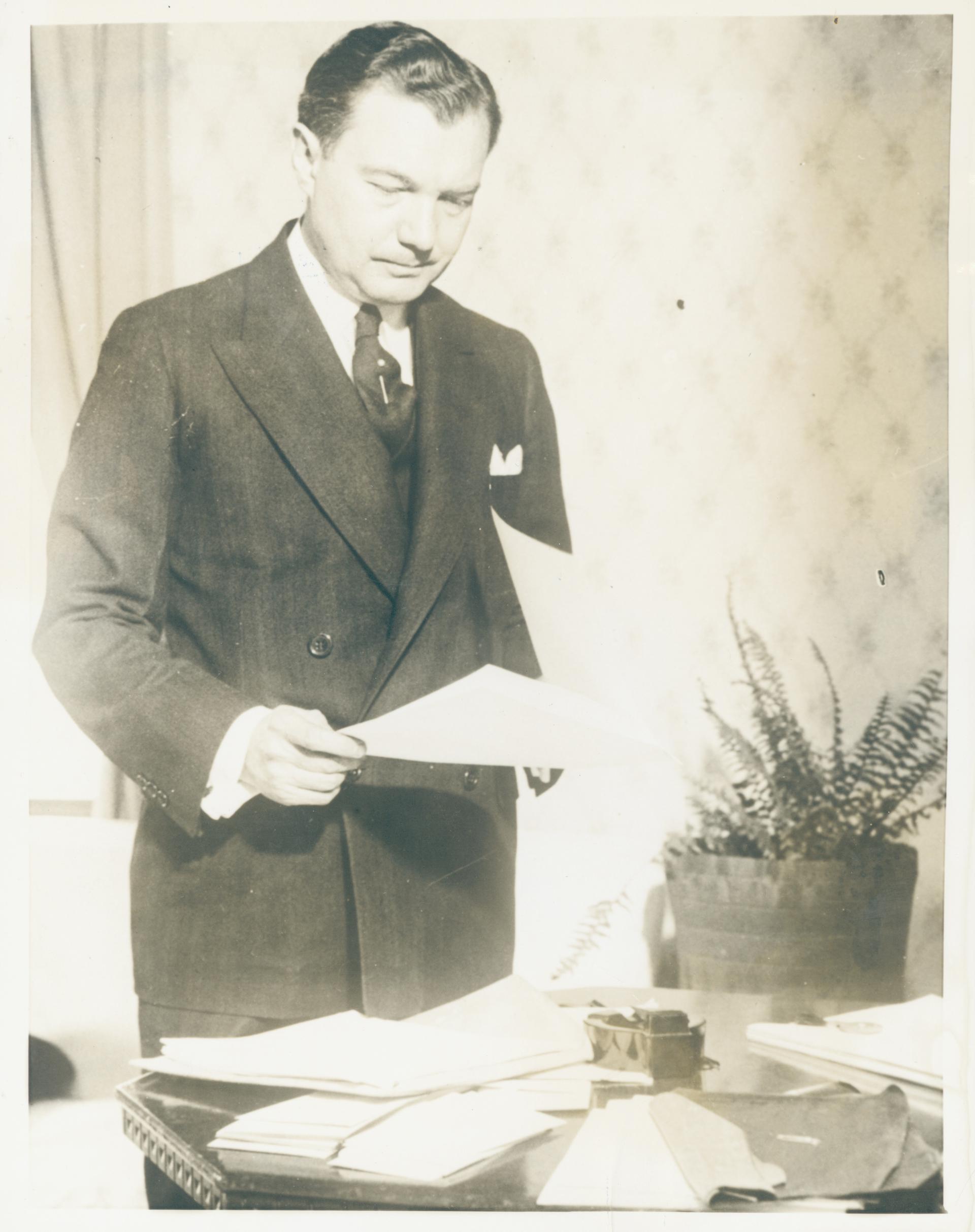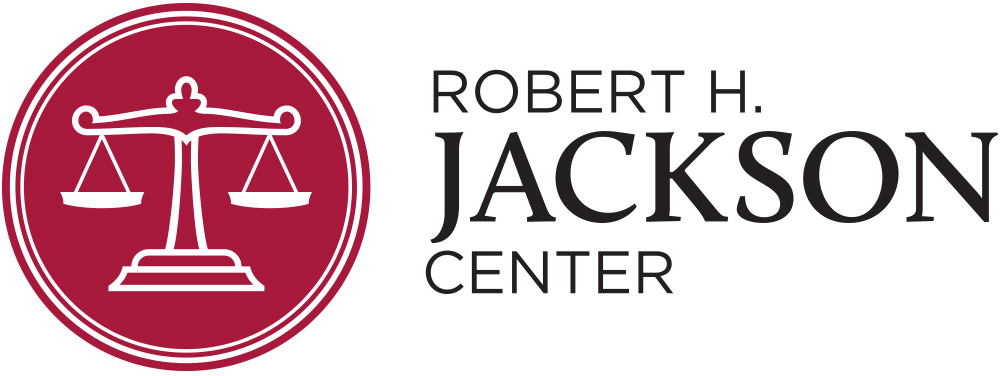
|
|
Justice at Home
"The hope of the United States is that out of humble homes, unknown to either
fame or wealth, will come men and women who will prepare themselves and grow to a mastery of industry and politics."
-Robert H. Jackson, Address to the Daughters of the American Revolution
|
|
Welcome to Justice at Home, a special edition newsletter from the Robert H. Jackson Center that will hit your inbox every 3 weeks with updates on our virtual programming, lesson plans and lectures, and interesting finds from our digital archives.
If you enjoy this newsletter, please pass it on to a friend and share it on your social media pages. Make sure to tag us (@roberthjacksoncenter) and use the hashtag #JusticeatHome.

|
|
Tea with RHJC: Digital Inclusion
Every Thursday at 3pm live on our Facebook page, Tea Time with the Jackson Center takes both a look back at Jackson's place in history and a look forward showing how his legacy influences current events. You do not have to have a Facebook account to join us - simply click here to see our Facebook page, watch previous #TeawithRHJC events, and join us live on Thursdays at 3pm. The recorded videos are also uploaded onto the Jackson Center's website & YouTube channel.
This week's Tea features Joshua Edmonds, Director of Digital Inclusion for the City of Detroit. Edmonds is the first person to hold this role in Detroit's city government, making it one of a growing number of cities to have a full-time employee engaging with issues of digital equity. Joshua & Kristan will discuss the community impact of the digital divide and the importance of digital inclusion.
Recent guests have included:
-Jon Hanson, the Alan A. Stone Professor of Law and Co-Director of the Systemic Justice Project and the Project on Law and Mind Sciences at Harvard Law School. Jon and Kristan discussed the lenses through which we can view justice and how that impacts working towards equity for all.
-Riyaz Kanji, a leading trial and appellate litigator on behalf of Indian nations and tribes across the country, including before the Supreme Court. Riyaz and Kristan discussed tribal sovereignty, the recent historic Supreme Court decision in McGirt and its impact, and what can be learned about justice from the tribal system.
Please follow us on Facebook, Twitter and Instagram, and share the videos with your family and friends on social media using the hashtag #TeawithRHJC.
|
|
London Agreement and Charter
Our first Tea Time with the Jackson Center featured RHJC President Kristan McMahon, who discussed what she learned about the London Agreement and Charter, which was signed 75 years ago this August.
Click on the above video to watch the Tea with RHJC in its entirety.
|
|

From Jackson's Desk
Robert H. Jackson was a gifted orator and writer, and many of his articles and transcripts of his speeches are housed on our website. We feature them in our weekly #TuesdayMotivation and #SundayQuote on the Jackson Center's social media pages.
In October of 1949, Justice Jackson gave an address before the Canadian Bar Association, which was later published under the title "Nuremberg in Retrospect: Legal Answer to International Lawlessness." Justice Jackson reflected on the legal and procedural foundations of the trial. In this excerpt, he describes the formation of the London Agreement and Charter:
"To try to bring some order out of this chaos, representatives of the four powers met in London in June of 1945. The published minutes of this conference record the discussions and conflicts, concessions and compromises which produced the Charter of the Nuremberg International Military Tribunal. I doubt whether a more novel or challenging task ever was set before members of the legal profession. All countries chose delegates who were preeminently lawyers rather than diplomats or politicians, although not strangers to these activities. All had long practical trial experience and approached the negotiations as a technical professional task, with the utmost good will toward each other and a determination to succeed. All agreed in principle that no country reasonably could insist that an international trial should be conducted under its own system and that we must borrow from all and devise an amalgamated procedure that would be workable, expeditious and fair. The conference resulted in an agreement, signed for the four powers by delegates high in their respective judicial system, who had shared responsibility for negotiating it.”
Read the entire address here.
|
|

This Month in Jackson History
August 2, 1945- The London Conference concludes. For more than a month, during the summer of 1945, representatives of the Soviet, French, U.S. and U.K. governments attempted to reconcile their conflicting legal concepts and devise a workable procedure for the trial. At the core of these intense negotiations was Robert H. Jackson, appointed by President Truman as the Chief of Counsel for the U.S. at the International Military Tribunal (IMT). Read more on our website here.
August 8, 1945-The United States, England, France and the Soviet Union signed the London Agreement. The London Agreement & Charter became the basis for the trials before the IMT at Nuremberg. Read more on our website here.
|
|
From the Archives
Jackson assigned his son, William, to his team at the International Military Tribunals in Nuremberg. William, a Yale Law School graduate, served as Jackson's executive assistant. He is seen here leaving the courtroom at Nuremberg behind his father after a court session.
Photo Credit: Ray D'Addario, U.S. Army Pictorial Service, World War II

|
|

|
|
The Age of Robert H. Jackson - London, Nuremberg, Today
Join us for this free global webinar as we celebrate the 75th Anniversary of the signing of the London Agreement and Charter and the establishment of the International Military Tribunal at Nuremberg on Saturday, August 8, 2020 – live at 9am EDT, 2pm BST, and 3pm CEST.
We will commemorate these historic events and discuss how the legacy of Robert H. Jackson and the Nuremberg Trials live in the world today.
Preregistration is required. You will receive a Zoom link to the webinar once you have registered. The webinar will be offered in English only and will be recorded.
Webinar Schedule
- Welcome: Kristan McMahon, President of the Robert H. Jackson Center
- Greetings: Ben Ferencz, last living podium prosecutor, Investigator of Nazi war crimes & the chief prosecutor for the United States Army at the Einsatzgruppen Trial
- Historical overview: John Q. Barrett, Professor of Law at St. John’s University, Elizabeth S. Lenna Fellow and Board member at the Robert H. Jackson Center
- Moderator: Michael Scharf, Dean, Case Western Reserve School of Law
Panelists
From the Robert H. Jackson Center:
- David Crane, Founding Chief Prosecutor, Special Court for Sierra Leone
- James Johnson, Prosecutor, Residual Special Court for Sierra Leone
- Leila Sadat, Director, Whitney R. Harris World Law Institute, James Carr Professor of International Criminal Law, and Special Adviser on Crimes Against Humanity to the ICC Prosecutor
From London:
- Andrew Cayley, CMG QC, Director Service Prosecutions, Chief Military Prosecutor British Armed Forces.
- Mark Ellis, Executive Director, International Bar Association
- William A. Schabas, OC MRIA, Professor of International Law, School of Law, Middlesex University and Professor of International Criminal Law and Human Rights, Leiden University
From Nuremberg:
- Henrike Claussen, Director, Memorium Nuremberg Trials
- Navi Pillay, President of the Advisory Council, International Nuremberg Principles Academy
- Klaus Rackwitz, Director, International Nuremberg Principles Academy
This program is supported, in part, by donors to the Robert H. Jackson Center and the Whitney R. Harris Lectureship Fund
|
|
Thank you to our program partners!

|
|
Your Gifts, Your Future
Your gift of any amount to our 2020 Annual Fund helps support the Robert H. Jackson Center's curriculum-based grade school programs, summer internships for college and law students, Teacher Fellows program, notable lecture series, CLEs, and topical forums that invite meaningful conversations about important issues of law. With a gift of just $10 or more, consider joining our Bench Circle of monthly or quarterly supporters today and help sustain the kind of world in which you want to live.
|
|
Our Contact Information
*{{Organization Name}}*
*{{Organization Address}}*
*{{Organization Phone}}*
*{{Organization Website}}*
*{{Unsubscribe}}*

